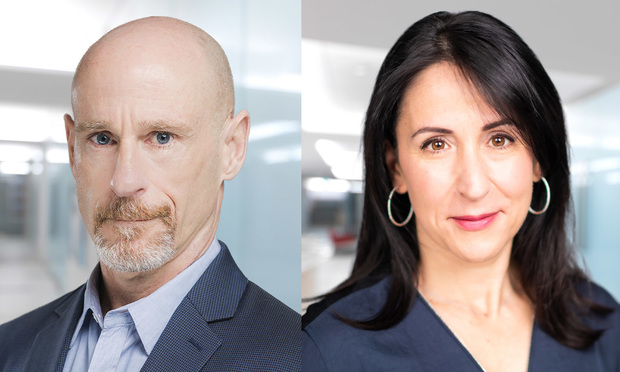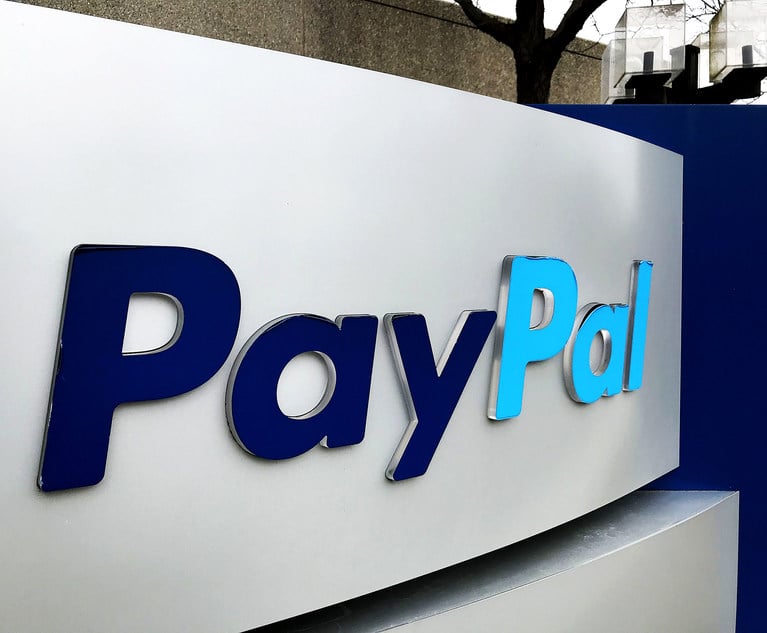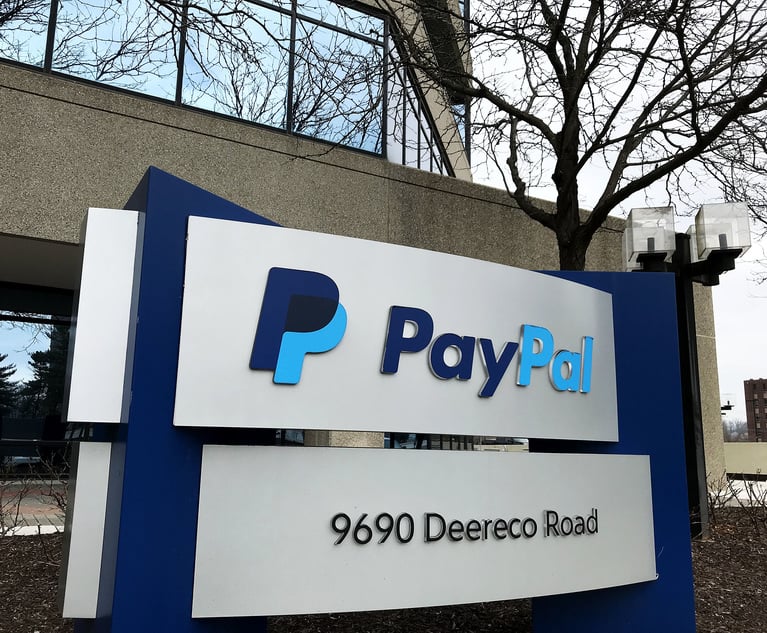Amazon Wins Patent Infringement MDL Appeal as Fee Motion Looms
Fenwick & West has led the charge for Amazon since PersonalWeb Technologies sued 80 of its customers. The Federal Circuit ruled Wednesday that a previous suit against Amazon, though voluntarily dismissed, precluded many of the new claims.
June 17, 2020 at 07:53 PM
4 minute read
 Fenwick & West partners J. David Hadden, left, and Saina Shamilov, right.
Fenwick & West partners J. David Hadden, left, and Saina Shamilov, right.Amazon.com and Fenwick & West have cemented the first half of a win in multidistrict patent infringement litigation over cloud computing technology.
The U.S. Court of Appeals for the Federal Circuit handed Amazon a sweeping win against nonpracticing entity PersonalWeb Technologies. The court agreed with U.S. District Judge Beth Labson Freeman of the Northern District of California that PersonalWeb's suit against 80 Amazon customers was precluded by earlier litigation between Amazon and PersonalWeb, and by the Kessler doctrine. Kessler is a 1907 U.S. Supreme Court decision holding that a patent owner who loses a case against a supplier can't then assert the same patents against the supplier's customers.
The decision knocks out most of PersonalWeb's case and adds momentum to Amazon as it gears up to argue in August for $6 million in exceptional case attorneys fees. Fenwick partner J. David Hadden argued the appeal for Amazon and several co-defendants, with help from partners Saina Shamilov and Todd Gregorian and associate Ravi Ranganath.
PersonalWeb had argued that Kessler doesn't apply when patent owners voluntarily dismiss their claims with prejudice, as opposed to fully litigating them. A Federal Circuit panel led by Judge William Bryson disagreed. "Such a proposition would leave the patentee free to engage in the same type of harassment that the Supreme Court sought to prevent in Kessler, a result that would be inconsistent both with Kessler itself and with this court's cases interpreting Kessler," he wrote in In re PersonalWeb Technologies.
PersonalWeb sued Amazon in the U.S. District Court for the Eastern District of Texas in 2011, accusing it of violating its "true name" patents for reliably identifying and accessing files or data. PersonalWeb primarily accused Amazon Web Services' Simple Storage Service (S3) of infringing. PersonalWeb dismissed the case in 2014 with prejudice, without Amazon taking a license.
Then in 2018, PersonalWeb asserted the same family of patents against 80 Amazon Web Services customers such as Airbnb, Reddit and Square that use S3 and other Amazon functionality. The suits were spread out across at least six different jurisdictions and prompted Amazon to sue for a declaratory judgment of noninfringement in San Jose.
All of the cases were rolled into a multidistrict litigation before Freeman. She ruled last year that most infringing conduct that predated the Texas judgment was barred by claim preclusion, and that most that came after was barred by Kessler. Earlier this year, she dismissed PersonalWeb's remaining claims on summary judgment, which are now being briefed on appeal.
In the appeal decided Wednesday, PersonalWeb had argued the Texas judgment shouldn't bar its new suits, because the Texas claims weren't fully litigated and, although they targeted the same products, they focused on different functionality.
Bryson disagreed on both counts. "At most, PersonalWeb has shown that it emphasized different facts in support of a different theory of infringement in the prior case," Bryson wrote. "But that is not enough to avoid claim preclusion."
As for Kessler, the court rejected the notion that a previous case must be fully litigated for the doctrine to apply. "Contrary to PersonalWeb's assertions, the rule we apply here will not interfere with the ability of parties to resolve patent disputes," Bryson wrote. "To the extent that a plaintiff wishes to settle an infringement action while preserving its rights to sue the same or other parties in the future, it can do so by framing the dismissal agreement to preserve any such rights that the defendant is willing to agree to."
Judges Evan Wallach and Richard Taranto concurred.
PersonalWeb was represented by Stubbs Alderton & Markiles.
This content has been archived. It is available through our partners, LexisNexis® and Bloomberg Law.
To view this content, please continue to their sites.
Not a Lexis Subscriber?
Subscribe Now
Not a Bloomberg Law Subscriber?
Subscribe Now
NOT FOR REPRINT
© 2025 ALM Global, LLC, All Rights Reserved. Request academic re-use from www.copyright.com. All other uses, submit a request to [email protected]. For more information visit Asset & Logo Licensing.
You Might Like
View All
Free Microsoft Browser Extension Is Costing Content Creators, Class Action Claims
3 minute read
'It's Not Going to Be Pretty': PayPal, Capital One Face Novel Class Actions Over 'Poaching' Commissions Owed Influencers

'Biggest Influencer Scam of All Time'?: PayPal Accused of Poaching Commissions Via Its 'Honey' Browser Extension
Law Firms Mentioned
Trending Stories
- 1Data Breaches in UK Legal Sector Surge, According to ICO Data
- 2PayPal Faces New Round of Claims; This Time Alleging Its 'Honey' Browser Extension Cheated Consumers
- 3Fired NLRB Member Seeks Reinstatement, Challenges President's Removal Power
- 4NY Inspector General Announces Attorneys Hired to Lead Upstate Region and Gaming
- 5Carol-Lisa Phillips to Rise to Broward Chief Judge as Jack Tuter Weighs Next Move
Who Got The Work
J. Brugh Lower of Gibbons has entered an appearance for industrial equipment supplier Devco Corporation in a pending trademark infringement lawsuit. The suit, accusing the defendant of selling knock-off Graco products, was filed Dec. 18 in New Jersey District Court by Rivkin Radler on behalf of Graco Inc. and Graco Minnesota. The case, assigned to U.S. District Judge Zahid N. Quraishi, is 3:24-cv-11294, Graco Inc. et al v. Devco Corporation.
Who Got The Work
Rebecca Maller-Stein and Kent A. Yalowitz of Arnold & Porter Kaye Scholer have entered their appearances for Hanaco Venture Capital and its executives, Lior Prosor and David Frankel, in a pending securities lawsuit. The action, filed on Dec. 24 in New York Southern District Court by Zell, Aron & Co. on behalf of Goldeneye Advisors, accuses the defendants of negligently and fraudulently managing the plaintiff's $1 million investment. The case, assigned to U.S. District Judge Vernon S. Broderick, is 1:24-cv-09918, Goldeneye Advisors, LLC v. Hanaco Venture Capital, Ltd. et al.
Who Got The Work
Attorneys from A&O Shearman has stepped in as defense counsel for Toronto-Dominion Bank and other defendants in a pending securities class action. The suit, filed Dec. 11 in New York Southern District Court by Bleichmar Fonti & Auld, accuses the defendants of concealing the bank's 'pervasive' deficiencies in regards to its compliance with the Bank Secrecy Act and the quality of its anti-money laundering controls. The case, assigned to U.S. District Judge Arun Subramanian, is 1:24-cv-09445, Gonzalez v. The Toronto-Dominion Bank et al.
Who Got The Work
Crown Castle International, a Pennsylvania company providing shared communications infrastructure, has turned to Luke D. Wolf of Gordon Rees Scully Mansukhani to fend off a pending breach-of-contract lawsuit. The court action, filed Nov. 25 in Michigan Eastern District Court by Hooper Hathaway PC on behalf of The Town Residences LLC, accuses Crown Castle of failing to transfer approximately $30,000 in utility payments from T-Mobile in breach of a roof-top lease and assignment agreement. The case, assigned to U.S. District Judge Susan K. Declercq, is 2:24-cv-13131, The Town Residences LLC v. T-Mobile US, Inc. et al.
Who Got The Work
Wilfred P. Coronato and Daniel M. Schwartz of McCarter & English have stepped in as defense counsel to Electrolux Home Products Inc. in a pending product liability lawsuit. The court action, filed Nov. 26 in New York Eastern District Court by Poulos Lopiccolo PC and Nagel Rice LLP on behalf of David Stern, alleges that the defendant's refrigerators’ drawers and shelving repeatedly break and fall apart within months after purchase. The case, assigned to U.S. District Judge Joan M. Azrack, is 2:24-cv-08204, Stern v. Electrolux Home Products, Inc.
Featured Firms
Law Offices of Gary Martin Hays & Associates, P.C.
(470) 294-1674
Law Offices of Mark E. Salomone
(857) 444-6468
Smith & Hassler
(713) 739-1250







